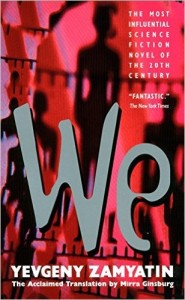In 1917, Nicholas II, Emperor of All Russia, was toppled, leaving in his wake a slew of provisional governments which could be likened to anarchy. In the midst of a bloody three year civil war, Yevgeny Zamyatin wrote his dystopian novel We. The work presented a futuristic society in which people were identified by letter and numbers and worked mindlessly for the betterment of the “One State.” ((Yevgeny Zamyatin. We . Translated by Natasha S. Randall. New York: Random House, 2006.)) The main character, D-503 recounted his descent from a respected mathematician of good standing within the state, to the accomplice of a revolutionary looking to return society to its natural state. Zamyatin sharply satirized the utopian ideals of many of his contemporaries, specifically those pertaining to the glorification of machinery. Zamyatin often likened D-503 to a machine, at one point his hero explicitly stated “I am like a machine being driven to excessive rotations: the bearings are incandescing and, in a minute, melted metal will begin to drip and everything will turn to nothing. Quick: get cold water, logic.” ((Zamyatin, 119))
The concept of man as machine alludes to those in 1920 Russia who feverishly purported that mechanization was a savior; if the proletariat could be made into machines, Russia would infinitely prosper. After D-503’s revolutionary lover I-333 hatched a plot to steal the Integral space ship, the State Gazette, the newspaper of the “One State,” announced a forced procedure to remove all citizens’ imaginations. In this announcement, the benefits were described as “you will be perfect, you will be machine-equal.” ((Zamyatin, 158)) This desire for the automation of humanity, for a “divinely rational” ((Zamyatin, 61)) life culminated in the loss of all mortal values and joys; happiness became the absence of thought and arithmetic replaced all emotion. Zamyatin criticized both the ideas behind and the very revolution that had occurred in front of his eyes. D-503, in attempting to confine the world to the finite, spoke for a Bolshevik blinded by utopian ideals: “our revolution was the last. And there cannot be any more revolutions…everyone knows that…” ((Zamyatin, 153))
Picture from: http://ecx.images-amazon.com/images/I/518NyrtPIkL._SX306_BO1,204,203,200_.jpg

